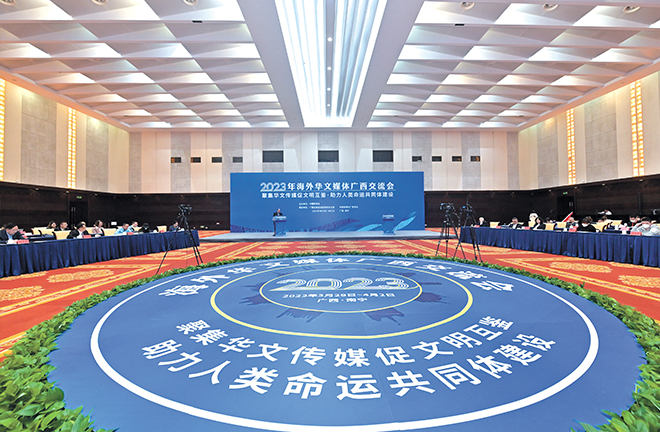Implementing the GCI for a human community with a shared future

A symposium on promoting inter-civilization exchanges for a human community with a shared future in Nanning, Guangxi Zhuang Autonomous Region, Mar. 30 Photo: CFP
The 18th National Congress of the Communist Party of China (CPC) in 2012 proposed raising the awareness of a human community with a shared future. This proposal emphasizes the importance of accommodating the legitimate concerns of others when pursuing its own interests and promoting common development of all countries when advancing its own development. Countries should establish a new type of global development partnership that is more equitable and balanced. Since then, building a human community with a shared future has become a distinctive diplomatic philosophy for China in the new era.
Common progress
The Global Civilization Initiative (GCI) represents another important public good provided by China to the international community in the new era. As a major country, China recognizes the importance of assuming significant responsibilities. The CPC is committed to “pursuing high-quality development and promoting global growth and prosperity,” “safeguarding international fairness and justice and promoting world peace and stability,” and “promoting inter-civilization exchanges and mutual learning and advancing the progress of human civilizations.” The CPC promotes the common development of the world while benefiting the Chinese people, seeking the common progress of all humanity while realizing the great rejuvenation of the Chinese nation.
Civilizational advancement
Promoting the building of a human community with a shared future is to inspire countries globally to jointly build a better world under different social systems, ideologies, historical cultures, and development levels. The GCI advocates “respect for the diversity of civilizations” and “common values of humanity,” highlighting the dialectical unity between the diversity of world civilizations as well as their commonalities. It is a manifestation of the Chinese civilization’s pursuit of common ground while reserving differences and inclusiveness.
In today’s world, where the futures and destinies of all countries are closely intertwined, we must adhere to equality, mutual learning, dialogue and inclusiveness among civilizations.
Only through equal dialogue under the premise of mutual respect and inclusiveness can we promote exchanges and mutual learning among civilizations, transcend estrangement, promote the inheritance and creative transformation of brilliant cultures, and achieve innovative development in the process of societal modernization.
The vitality of civilizations is rooted in the process of exchanges and integration. By embracing different civilizations and drawing upon their strengths, we can foster the advancement of all civilizations.
Common values of humanity
The GCI has offered valuable insights into the philosophy of a human community with a shared future which emphasizes a symbiotic community of shared interests. Tackling global challenges necessitates the collective cooperation of countries worldwide. This philosophy represents Chinese wisdom for the enhancement of global governance.
The GCI advocates for the common values of humanity. Peace, development, equity, justice, democracy and freedom are the common aspirations of all peoples. Different countries and civilizations should develop together in mutual respect, and cooperate in seeking common ground while reserving differences.
The GCI has provided Chinese experience for establishing a new order of global civilizational dialogues. Building a human community with a shared future requires not only the active involvement of people worldwide but also the consensus among individuals from diverse nationalities, beliefs, cultures, and regions.
Xu Bingrong is from the School of Marxism at Jiangsu Second Normal University.
Edited by ZHAO YUAN
